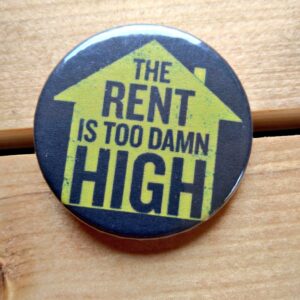If you haven’t heard that we in New Hampshire, and especially communities in the Seacoast area, have been experiencing a housing crisis, then we heartily welcome you back from the five-year spiritual retreat in the mountains that you have clearly been on.
Even before COVID, the supply of housing that normal people could afford was running dry. Since 2020, prices have approximately doubled throughout much of the southern half of the state. This is not merely an issue of pushing everyday workers out of the areas where they are needed (though that’s certainly true). Nor is it merely an exacerbation of the graying of the Granite State, as we can neither keep nor attract the younger people who are vital to keeping a community from dying (although it absolutely is that, too).
This is a real, visceral emergency to the thousands of people who have been displaced. For the 60 percent of the population who live paycheck to paycheck, it is a matter of not knowing whether they might be living out of their car next month, wondering where they might be able to shower before going into work, and what to do with the family dog while they try to secure another place to live. It is a major economic crisis, but it is also a very grave human emergency. As the number of people without a home (despite still working full time) has been climbing, just in the last couple of weeks two people in New Hampshire have died from exposure.
The housing trend has been fueled by many things, but in large part is being pushed by a recent trend of a certain group of investment landlords who have been coaching each other to raise rents far beyond what even the hot market would dictate because that market can easily be blamed for the raises. This new school of landlords openly states there is no price for a multifamily property that is too much to pay. And so many have been acquiring properties at well beyond 50 percent over current market price, even at the height of skyrocketing values, because they believe rents can be hiked to nearly any level.
In my own town one such landlord raised rents to 2.5 to 3 times the January 2022 level, in some cases more than $1,000 increases. While this may seem to go against our sense of supply and demand, realize that those forces apply less to costs that economists refer to as “inelastic.”
Essentially, these landlords can charge whatever they like because people have few options other than to pay. Pay or go without shelter. It is like selling life rafts to passengers on a sinking ship, and such a situation results in effective price-fixing. In addition, these same landlords engage in fraudulent “rent-seeking behavior” as they guide their tenants to public and non-profit services meant to help tenants in emergencies pay for the new rent hikes. These often happen to match exactly how much the public services will provide.
So, the question is what we can do about it? What we are willing to do to help our communities have productive members with robust, stable, safe housing? A bill I submitted, before the House currently, would allow municipalities to enact any of a wide range of regulations on rental practices, from simply increasing notice periods for rent increases to temporarily capping rents on certain types of properties.
Wow! I bet you have questions, or maybe even a few choice words. So here is a little FAQ about HB 95 that I have put together:
Q: Isn’t this rent control!?! What are you, a Communist?
A: Regulations of markets are different from social spending paid for by taxes (which we do as well). We regulate markets all the time, and before you think that that is always bad, realize that without regulations, industry could (and once did) do things like pour unlimited toxic chemicals into rivers; use small children to do dangerous jobs and pay them slave wages; expose workers to all sorts of carcinogens and other dangers; work people for 100 hours a week or more with little in the way of breaks or health accommodations; and create monopolies that crush the very competition the market depends on.
A completely unregulated market results in the same “tyranny of the strong man” that political anarchy results in. So, the question is not whether we should ever regulate a market, but rather how we determine when and how so that the best outcomes for the whole society are achieved. Right now, the housing market is very clearly skewed in one direction. Some temporary regulations, that are quickly removed by agile municipal governments, can help balance the market so that we can enjoy both economic prosperity for owners, as well as residents and workers that can comfortably and stably live in their communities.
Q: Well don’t you think all these towns are going to pass all these onerous restrictions and put all the landlords into bankruptcy?
A: Nope! In fact, I think very few municipalities will do anything, and those that do will do so very temporarily and conservatively. In fact, I know. The incentive on the part of town governments is to have revenue, which higher home values increase (which are increased themselves by the higher rents). It is only when a community is suffering so much from a lack of workforce, displaced and even homeless residents, that a town government will be forced to act.
But if the leaders of a town, who know the dynamics within that town better than anyone else (and far better than Concord ever could), finally get to the point that they believe some emergency measures are necessary — then who in the world is the state, made up of people from all disparate places, to tell those towns “no”? Towns can enact, and repeal, local ordinances within weeks, meaning that this enabling bill would allow them to balance the current fevered market with surgical precision. And since their primary concern is revenue, we can be guaranteed that they will do the bare minimum to address the housing emergency and will reverse policies before the market pendulum swings too far in the other direction. In addition, any policies that overly restrict landlords from being able to cover costs would likely be found unconstitutional.
Q: Don’t ‘rent control’ measures result in landlords not repairing units and developers not building the housing supply we need?
A: That is absolutely a potential effect of long-term rent control. But as I mentioned, towns primarily want revenue. They are also very agile, so as soon as town governments see any severe market reactions, they can and, I predict, will reverse course. In fact, allowing towns to do this gives us the classic “laboratories of democracy” scenario that our federalism prides itself in. Other communities will be able to learn from what towns do to respond to housing problems, and what the results were.
But if you are specifically concerned about decreased maintenance, know that towns are already able to (and should) adopt Certificate of Compliance systems whereby units are inspected by the town for safety and standards every couple of years or so, paid for by modest inspection fees.
And if supply-building is most prominent in your mind, know that supply itself is not the actual problem—New Hampshire has 74 empty homes for every single unhoused individual. Not family — individual. The issue is affordable supply. And that is simply because, due to the aforementioned inelasticity of housing, there simply is no incentive to build affordable (never mind affordable high-quality) housing.
And while we should be taking other measures to increase affordable supply, those measures will take on the order of years to have an impact, and at least allowing towns to enact these policies provides the short-term “incentives” to keep housing more affordable, as we build and take other measures to deal with the crisis long-term.
Q: Isn’t the real problem zoning, which prevents the building of large apartment complexes that we need and developers want to build?
A: I completely agree that zoning is a problem, and that we need to be less afraid of increased density. There are really great “rural character” ways of increasing density, like “open cluster” planning and thoughtful multifamily design, for example. In fact, I have also prime sponsored a bill that will increase homeowners’ rights to build an ADU (Accessory Dwelling Unit, a secondary housing unit on a single-family residential lot.) It’s a fantastic, decentralized way to increase high-quality housing supply while helping people be able to afford to stay in and buy homes. I am so proud that this bill is so robustly bipartisan, from libertarian-aligned to hard-left progressives, and with a wide range of organizational support, from housing advocates to builders and town planners.
However, it’s also clear that, without incentives to keep housing affordable, we are not going to build our way out of this. Those 74 empty homes for every person without shelter are in opulent supply, yet have not reduced prices. Simply allowing more building just increases that number to 75 or 80, but does not increase affordability. While many town residents simply do not want giant apartment buildings in their communities (and I can tell you as a life-long apartment dweller, they aren’t a blast to live in, either), making the already-existing multifamily structures affordable (and maybe those 74 empty homes, too) will provide enough places for everyone to live, without the need to build a single structure.
Q: You said this would help homeowners, too?
A: Yes, because homeowners benefit from robust communities where jobs are filled, workers can stably live long term, and young people buy homes. In fact, more affordable rents provide the cooling effect to the lava-hot market that is needed to help increase homeownership, and higher homeownership rates improve communities across the board. Residents stay longer, are more invested in the community, and develop better relationships. Businesses are stabilized by stable populations of both consumers and workers, and prosperity increases. It is the long view, but in the end that is the only economically healthy view. Having said that, we need to get there, and enabling towns to use their discretion gives us the steppingstones to do so.
Weighing pros and cons, this is the quickest and most exactingly effective response to the biggest crisis facing the state, and yet is enabling-only, with towns having every incentive to be cautious in adopting, and quick to adjust in the face of any negative effects. With such safety barriers in place, how can we possibly choose to allow the crisis to worsen and thousands more to be displaced for the next several years while we address things like zoning and building, rather than simply allow towns the freedom to address the housing emergency as they see fit?




